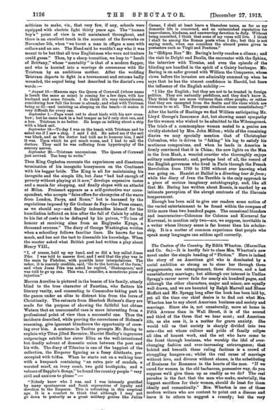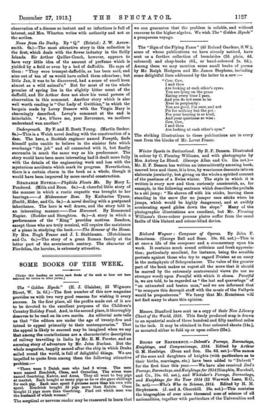The Custom of the Country. By Edith Wharton. (Macmillan and
Co. 6s.)—It is hardly fair to class Mrs. Wharton's new novel under the simple heading of "Fiction." Here is indeed the story of an American girl who is dominated by a social ambition so strong as to steer her through three engagements, one entanglement, three divorces, and a last unsatisfactory marriage; but although our interest in Undine Spragg's career never fails for nearly six hundred pages, and although the other characters, major and minor, are equally well drawn, and we are haunted by Ralph Marvell and Elmer Moffatt and Mr. Spragg long after the book has been laid by, yet all the time our chief desire is to find out what Mrs. Wharton has to say about American business and society and marriage. Since she is, not unnaturally, more at home in Fifth Avenue than in Wall Street, it is of the second and third of the three that we hear most ; and American life, as she sees it, is a matter for grave anxiety. She would tell us that society is sharply divided into two sets—the set whose culture and pride of family eclipse all idea of honest work, and the set who have come to the front through business, who worship the idol of ever- changing fashion and ever-increasing extravagance; that behind and beneath these ruling factions is a, crowd of struggling hangers-on; whilst the real cause of marriage without love, and divorce without shame, is the substituting of Business for Romance in the hearts of the men. "If we cared for women in the old barbarous, possessive way, do you suppose we'd give them up as readily as we do? The real paradox is the fact that the men who make, materially, the biggest sacrifices for their women, should do least for them ideally and romantically." Mrs. Wharton is one of those modern writers who are content to point out a disease and leave it to others to suggest a remedy; but the very
observation of a disease so instant and so infectious is full of interest, and Mrs. Wharton writes with authority and not as the scribes.



































 Previous page
Previous page